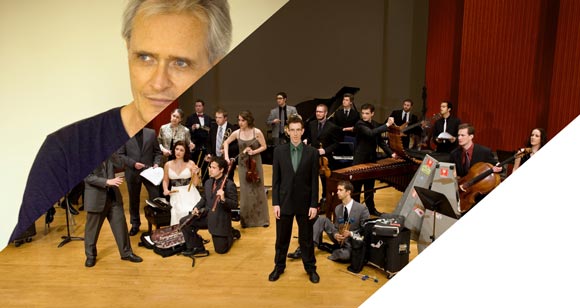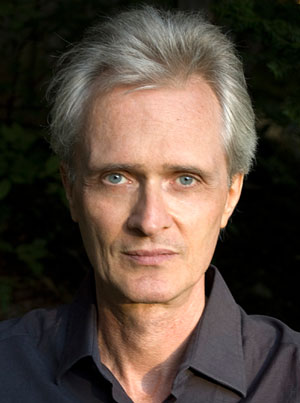
The much-anticipated world premiere of Scott Johnson’s “Mind Out of Matter”–the composer’s largest work to-date–will be performed by Alarm Will Sound at the Alexander Kasser Theater in Montclair, NJ, October 4 and 5. Alan Pierson is conducting. The work is a Peak Performances commission.
In “Mind Out of Matter”, Johnson, the first composer to create music from the rhythm and pitch of spoken words, samples the controversial writings of philosopher Daniel Dennett. Working like a tone poem with every syllable of every word in the piece written with its pitch and rhythmic potential, “Mind Out of Matter” shares its sensibility with Dennett, a dedicated Darwinist, who insists that a sense of wonder at the universe is revealed through scientific knowledge, not religion. Since Johnson is a man of ideas as well as music, the audience’s understanding the words is critical to the piece.
What follows is a description by Johnson of how he has arrived at his unique point of view about music. He begins with a question: “Why can’t there be contemporary classical music that sounds like the time and place I live in?
“I’ve devoted most of my efforts to creating a hybrid music, in which the complexity of the classical tradition opens a welcoming door to musical details and emotional associations from popular musics –- not because some imagined audience might enjoy them, but because I enjoy them. A little background will explain how and why this is personally and artistically important to me.
“Many civilians out there are puzzled because most of the “classical” composers they’ve heard of seem to be dead, and some are curious about what contemporary classical music might be like. That’s where I started also, when as a kid playing guitar in rock bands, I heard the “Rite of Spring” for the first time. By the time I got to college, I was studying music theory during the week, and playing in bars on the weekends. But this cultural moment, in the early 1970’s, was the high water mark of High Modernist compositional styles, and I had simply never heard written music built from the familiar instruments and gestures of my own culture. To do so was, quite simply, to violate a taboo, and any offender would be duly excluded from the company of the “serious” composers of the Western tradition. This isolationist attitude, as we can see now, would itself have offended most of those composers, who tended to regularly mount raids on their own folk musics.
“So I gave up. At 22 I moved to New York City, determined to abandon music and be a visual artist, and landed in Soho and the East Village, which were then the artist neighborhoods of lower Manhattan. Being downtown in 1975 was like being in Montparnasse in the 1920’s –- within a year or two I’d met many of the best painters, sculptors, musicians, and choreographers of the time, and this open-ended atmosphere convinced me that I might able to come up with some serious music that included my bar-band chops. Sound crept back into my still-immature visual work, and within a few years only music was left.”

 1980’s, he has been influential in the trend towards incorporating rock-derived instrumentation into traditionally scored compositions, and the use of taped, sampled and MIDI-controlled electronic elements within instrumental ensembles. His music has been heard in performances by the Kronos Quartet, the Chamber Music Society of Lincoln Center, the Bang On A Can All-Stars, and his own ensembles; in dance works performed by the Boston Ballet, the London Contemporary Dance Theater, the Ballets de Monte Carlo; and in Paul Schrader’s film Patty Hearst. His music recorded on the Nonesuch, CRI, Point, and Tzadik labels.
Johnson’s scores generally employ both acoustic and electric/electronic instruments, and he has premiered most of his electric guitar writing himself. Compositions which feature sampled voice include the groundbreaking 1982 John Somebody, as well as Americans, Convertible Debts, The Value of People and Things and How It Happens, (commissioned by the Kronos Quartet, and based upon voice recordings of the late journalist I.F. Stone).
Awards include a 2006 Guggenheim Fellowship, a Koussevitsky commission, two fellowships from the National Endowment for the Arts, and five grants from the New York State Council on the Arts; as well as grants and commission support from Lincoln Center, the Meet The Composer/Reader’s Digest Commissioning fund, the Jerome Foundation, the Brooklyn Academy of Music, and the Concert Artists Guild/Mary Flagler Cary Trust. New York City concert venues for Mr. Johnson’s own ensembles have included Lincoln Center’s Alice Tully Hall, the Knitting Factory, and The Kitchen, as well as concert halls, art museums, and festivals throughout Europe and North America.
Johnson’s recent concert appearances include Zankel Hall at Carnegie Hall, the Japan Society, the Lincoln Center Festival, the Brooklyn Academy of Music’s Next Wave Festival, Yale University, the Schleswig-Holstien Festival, and the Chamber Music Society of Lincoln Center’s “Great Day In New York” series. Other recent premieres include the Bang On A Can All-Stars at Lincoln Center, the New Millennium Ensemble and Cygnus at Merkin Hall, and Sentieri Selvaggi in Milan. Johnson has also published articles and essays on contemporary music, and has lectured at leading conservatories and universities, including San Francisco and Peabody Conservatories, Senzaku Ongaku Daigaku, New York University, The Manhattan School of Music, and Yale.
1980’s, he has been influential in the trend towards incorporating rock-derived instrumentation into traditionally scored compositions, and the use of taped, sampled and MIDI-controlled electronic elements within instrumental ensembles. His music has been heard in performances by the Kronos Quartet, the Chamber Music Society of Lincoln Center, the Bang On A Can All-Stars, and his own ensembles; in dance works performed by the Boston Ballet, the London Contemporary Dance Theater, the Ballets de Monte Carlo; and in Paul Schrader’s film Patty Hearst. His music recorded on the Nonesuch, CRI, Point, and Tzadik labels.
Johnson’s scores generally employ both acoustic and electric/electronic instruments, and he has premiered most of his electric guitar writing himself. Compositions which feature sampled voice include the groundbreaking 1982 John Somebody, as well as Americans, Convertible Debts, The Value of People and Things and How It Happens, (commissioned by the Kronos Quartet, and based upon voice recordings of the late journalist I.F. Stone).
Awards include a 2006 Guggenheim Fellowship, a Koussevitsky commission, two fellowships from the National Endowment for the Arts, and five grants from the New York State Council on the Arts; as well as grants and commission support from Lincoln Center, the Meet The Composer/Reader’s Digest Commissioning fund, the Jerome Foundation, the Brooklyn Academy of Music, and the Concert Artists Guild/Mary Flagler Cary Trust. New York City concert venues for Mr. Johnson’s own ensembles have included Lincoln Center’s Alice Tully Hall, the Knitting Factory, and The Kitchen, as well as concert halls, art museums, and festivals throughout Europe and North America.
Johnson’s recent concert appearances include Zankel Hall at Carnegie Hall, the Japan Society, the Lincoln Center Festival, the Brooklyn Academy of Music’s Next Wave Festival, Yale University, the Schleswig-Holstien Festival, and the Chamber Music Society of Lincoln Center’s “Great Day In New York” series. Other recent premieres include the Bang On A Can All-Stars at Lincoln Center, the New Millennium Ensemble and Cygnus at Merkin Hall, and Sentieri Selvaggi in Milan. Johnson has also published articles and essays on contemporary music, and has lectured at leading conservatories and universities, including San Francisco and Peabody Conservatories, Senzaku Ongaku Daigaku, New York University, The Manhattan School of Music, and Yale.